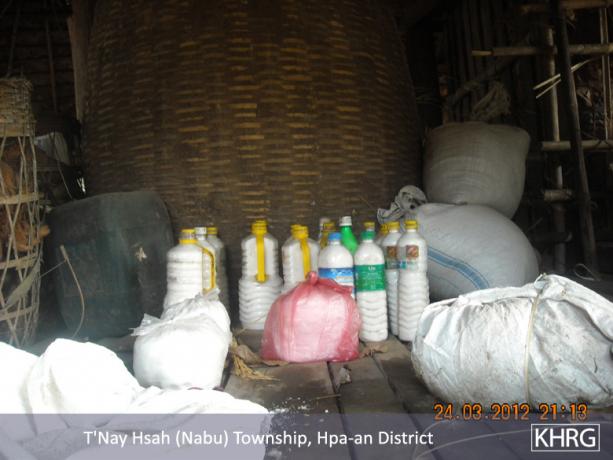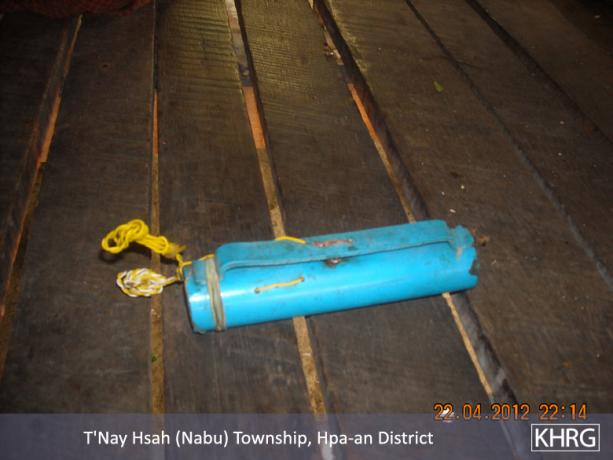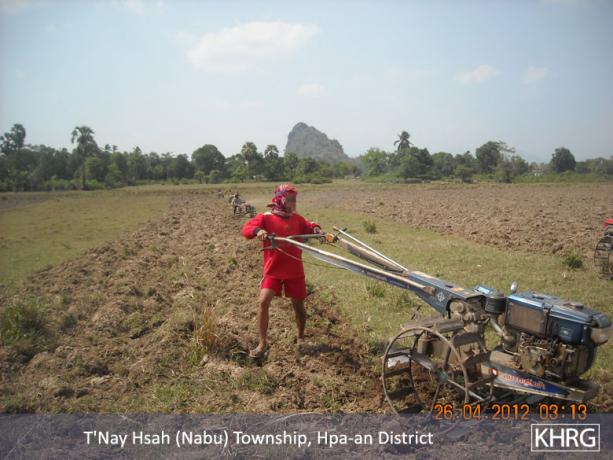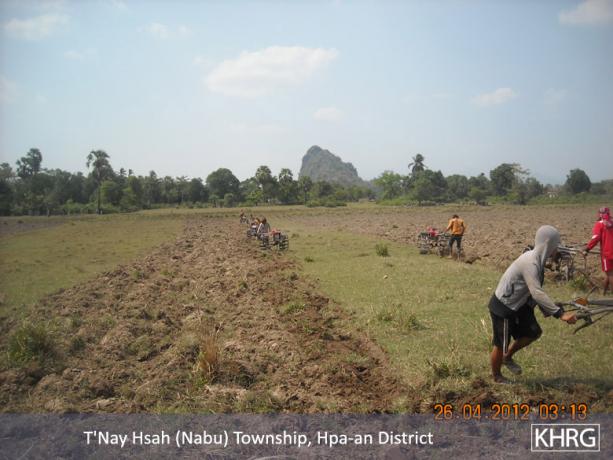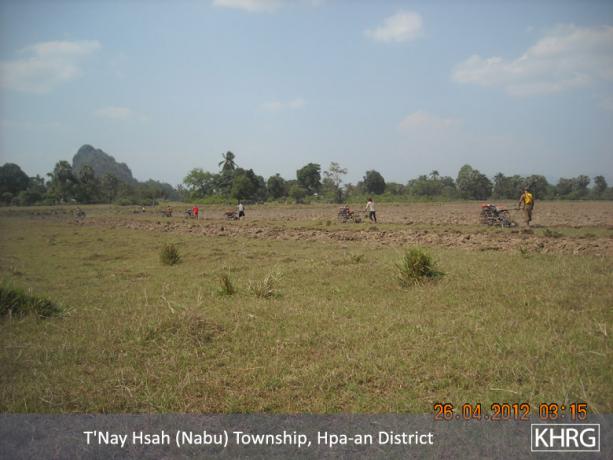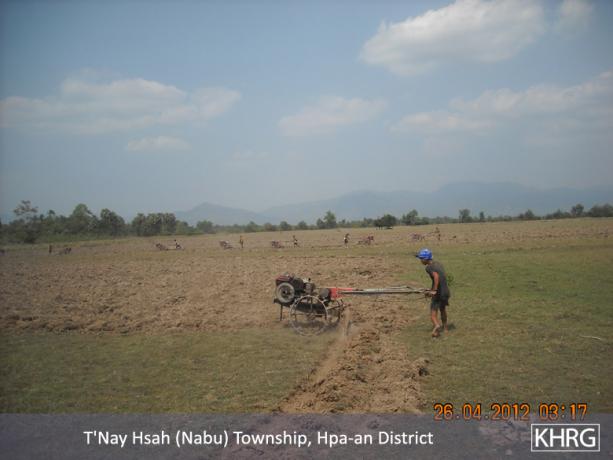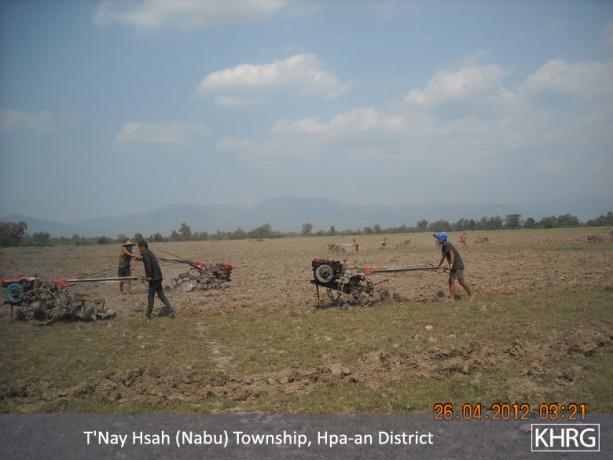This report includes a situation update submitted to KHRG in May 2012, by a community member describing events occurring in Pa'an District during the period between September 2011 and April 2012. It describes the planting of landmines by Border Guard soldiers near Y--- and P--- villages, resulting in villagers from B---, N--- and T--- being injured, and some villagers committed suicide after sustaining injuries. It also includes demands for forced labour by Tatmadaw LIBs #547, #548 and #549 in which villagers were required to harvest paddy on government land; this information concerning forced labour is also described in a news bulletin published by KHRG on June 22nd 2012, "Forced labour and extortion in Pa'an District." This report also includes information about the removal of 30 landmines by the Border Guard, before a landmine injury to one soldier halted the removal operations. In order to deal with problems related to insufficient landmine removal, villagers have taken precautions to limit their activities to areas unlikely to be mined. Due to limited opportunities for villagers to earn their livelihoods, some have begun to commercially produce charcoal and alcohol, or breed their livestock for consumption. Parents in these areas are also reportedly sending their children to Bangkok to assist the family income; young girls have also begun to work using their vocational skills to weave traditional bags.
Situation Update | T'Nay Hsah Township, Pa'an District (September 2011 to April 2012)
The following situation update was written by a community member in Pa'an District who has been trained by KHRG to monitor human rights conditions. It is presented below translated exactly as originally written, save for minor edits for clarity and security.[1]
The suffering of villagers as a result of landmines planted beside their village, their farms and their plantations by the Border Guard
On September 21st 2011, Border Guard Battalion #999 Commander Dee Dee and some of the Government [Tatmadaw] soldiers gathered together and went to fire at the KNLA [Karen National Liberation Army] Battalion #101 in W--- place, [which is between] Y--- village [and P--- village], Htee Wa Plaw village tract, T'Nay Hsah Township. The Border Guard and the Government soldiers conquered the KNLA Battalion #101's base in W--- place. After they conquered the base, the Border Guard started to plant landmines beside Y--- village, beside the villagers' farms, and beside P--- village. They [landmines] hit many villagers, and many of the villagers' cows and buffalos were also hit.
Later on, KNLA Battalion #101 withdrew to the other side of a heavily forested mountain. The forests are called P'Keh Hkee forest and Htee Klay Hkee forest. This place is next to Noh Kay village tract, and near to the villages of A---, N---, T--- and B---. These villages are in T'Nay Hsah Township. Border Guard Battalion #3, [commanded by] Battalion Commander Mya Hkaing and Battalion Deputy Commander Maung Ngway Heh, gathered with LIB [Light Infantry Battalion]#547, LIB #548 and LIB #549 and went again to attack KNLA Battalion #101. From November to December 2011, they fought by the P'Teh stream, which is next to N--- village.
Then, the Border Guard started to plant landmines beside the village, beside the villagers' farms, beside the well, on the boundaries of the farms, in betelnut [2] plantations, durian plantations and rubber plantations, and on the road that the villagers use for traveling. The villagers have been hit by landmines, and their buffalos and cows have also been [hit], so the village head went and asked the Border Guard soldiers, "Why didn't you tell the villagers that you planted landmines?" The Border Guard [soldiers] replied, "Village head, we didn't plant the landmines, they were planted by the KNLA." One of the village heads responded, "The KNLA soldiers planted landmines in the forest and they told the villagers where they had planted them. You [the Border Guard] planted landmines in our farms and in our plantations; why didn't you tell us?" Border Guard Company Commander Hpah Maw Hkoh replied to the village head, "You are disobedient and assist the KNLA soldiers, so we have to do things like this to you." Another village head replied, "We do not only assist the KNLA soldiers, we assist any troops that come into our village, and if they need something, we help all of them." Border Guard Company Commander Hpah Maw Hkoh told the village leader, "Ask the KNLA soldiers to remove all the landmines that they have planted and we will also remove all of our landmines."
On January 11th 2012, the KNU [Karen National Union] held a meeting about a cease-fire [with the Tatmadaw], and on January 12th 2012, they signed an agreement in Pa'an Town.[3] In February 2012, KNLA Battalion #101 and Border Guard Battalion #3 worked together following an order to remove the landmines. Those who came and removed the landmines were Border Guard Company Commander Hpah Maw Hkoh, with Sergeant Kee Kyaw, Private Htwee Heh Kay and Battalion Deputy Commander Maung Ngway Heh, and they managed it with 20 of their soldiers. With regards to the KNLA, 2nd Lieutenant K'Loo Koo and Hpah Htwee Maw managed it with about 15 soldiers. Some of the village heads accompanied them. They were able to remove 30 landmines altogether. At 3:00 pm on that same day, February 11th, a Border Guard soldier named Htwee Heh Kay was hit by one of their own landmines; because of that, the removal of landmines was stopped. The places where they removed landmines were in N--- and B--- in T'Nay Hsah Township. The landmines have caused a big problem for the villagers.
On April 10th 2012, when I arrived in T'Nay Hsah Township, I saw many villagers who were complaining differently in many villages. Some [villagers] do not dare go to their paddy farms or to their plantation farms. A reason for this, is that the Border Guard had planted landmines in their plantations, so some of the villagers were injured and many of the villagers' farm animals, such as cows, buffalos and goats were killed.
The people who gave [me] this information are Saw S--- from N--- [village], Uncle W--- from N--- village, W---s' mother from B--- village, Saw B--- from T--- village, Maung M--- from S--- village and Saw Y--- from Hs--- village. The villagers cannot identify all the villagers' names, including children. The six villagers whose names I reported are from different villages, and they all have to face the landmines problem. So, they complained that they need help from people to remove these landmines.
Since the [landmine] incidents started [to happen] in 2011 and 2012, landmines have detonated once a day or once every two days. The villagers who have suffered the most are from B---, N--- and T--- villages. The incidents [include] villagers who were hit by landmines and lost their legs, and some of their [B---, N--- and T--- villagers'] buffalos and cows also lost their legs. Some [of the villagers who] were hit by landmines and lost their legs, killed themselves, [some] by shooting [themselves] with "Peh Ploh", which is the [type of] gun that they use for hunting wild animals, and for others, by hanging themselves with a rope to die.
The perpetrators are Border Guard and the KNLA, and we can say that they are perpetrators because the two armies tried to fight against each other. This is a consequence of not removing the landmines, after they had planted them. Therefore, the villagers do not dare to travel and to find firewood outside of the village or near their farm, so they mostly find firewood in their village. Their buffalos, cows and goats are also tied up with ropes. As long as the landmines are not removed, the villagers have to protect themselves by renting farmland from other villagers in areas where there are no landmines, and helping other people plant paddy in order to get rice to be able to survive. As they have no other way [to earn] their livelihood, they have to make charcoal, produce alcohol and breed buffalos, cows, goats, pigs and chickens, but not in a large number, just for their daily survival. Moreover, they have sent their children to Bangkok [Thailand], and asked them to send their parents money. There has not been any improvement to the education system for the children and they cannot build a good school. The young girls work for their livelihood by [using] their vocational skills weaving bags; they [can] get 7,000 kyat (US $8.56)[4] per bag.
Forced labour in T'Nay Hsah Township
The villagers have to do forced labour every day. The forced labour is ordered by the Government army [Tatmadaw], which stays in L--- village. They are LIB #547, LIB #548 and LIB #549. Twenty years ago, in L--- village, most of the population was Muslim and there were also villagers who were Pwo Karen and Sgaw Karen. When the government army arrived and set up their camp, they got rid of all the Muslim and Karen [villagers]. They invaded all the farms, the plantations, and the villagers' land. They turned farms that they invaded into a so yah naing myin [government appropriated land]. On April 26th 2012, I went and took photos of their camp located in L--- village, and [photos] of where the government got rid of the villagers, and where the villagers now have to go and do loh ah pay[5] such as ploughing the confiscated farms.
The villagers had to go and plough every day. After they ploughed, they had to sow paddy [seeds], and after they had sowed them, the villagers had to harvest for them [the Tatmadaw]. The villagers had to do everything until the paddy [that the villagers carried] arrived at the place where they store rice. When the villagers went and worked for them, they had to bring their own materials such as hand tractors and enough [farming] materials. One village tract had to take responsibility for ten acres, ploughing, sowing and harvesting them until the paddy arrived at the place where the rice is stored. When the villagers went and ploughed, they [the government] gave them just three bottles of petroleum per day. When the villager worked for them the villager had to bring their own food each day. Moreover, the soldiers who were guarding the farm drove the cows that were eating nearby into their farms where they then detained them. After that they ordered the owner [of the cows] to come, they demanded money from them – 30,000 Kyat (US $36.67) for one cow. During my journey this time, I saw and heard the villagers complain that there were still many instances of forced labour and oppression by the government army.
Border Guard forced villagers
I would like to report what a monthly village head from B--- village told me, included below. On April 1st 2012, I went to B--- village. I met a female monthly village head and we talked about the forced labour. She told me that last year, in 2011, she had the responsibility of being the monthly village head. That was the time when people were planting paddy, and Border Guard Battalion Commander Mya Hkaing, who at that time was a member of the DKBA, ordered the villagers to plant paddy. Ten villagers from B--- were ordered to plant paddy. Ten villagers were ordered from each of the villages in Noh Kay village tract. There are four villages in Noh Kay village tract, including A---, T---, E--- and N--- villages. Moreover, [villagers from] the other village tracts that are in the village tracts of Yaw Kuh, Htee Klay, and Htee Hpoh also had to go on the same day. When they went they had to bring their own food. Each village tract was responsible for planting ten acres of paddy. They had to plant [the field] until it was finished.
In the past, [Border Guard Battalion Commander] Mya Hkaing was in the DKBA but now he is the commander of Border Guard Battalion #3.The [Border Guard] Battalion Deputy Commander is Maung Ngway Heh and their Battalion is located G--- village, K'Lah Koh camp in T'Nay Hsah Township. In the past, Muslim people lived in K'Lah Koh but they got rid of the Muslims and built their camp there. The place where Mya Hkaing ordered villagers to plant the paddy was near to Noh Hta Baw Mountain in L--- [village]. Now, the Battalion Commander Mya Hkaing has built an office near to Noh Hta Baw Mountain. The mountain has a big cave and he has opened several games such as cards, Ah K'Loh Wine and A'Nee Htaw Wine [types of Burmese gambling which are similar toroulette and slot machines] everyday. The Battalion also has a machine for Yaba[6] at the top of Noh Hta Baw Mountain. Nobody can go to the place where they produce Yaba because their soldiers are always guarding it. The villagers who go and play [gamble] use it [Yaba], and the soldiers [asked] the villagers who [they] trust to sell Yaba, but in villagers who sell Yaba report it.
When the villagers who go and gamble, use Yaba and drink, they pawn their farms and cows. Battalion Commander Mya Hkaing invaded about 20 farms in the area including other properties as well. Many villagers became poor because of this. Mya Hkaing ordered the villagers to do Loh Ah Pay in which they ploughed, harrowed, sowed, and harvested rice, until the rice arrived at the rice store. This year, after the villagers worked for the Burmese [Tatmadaw], they had to work for the Border Guard. The villagers who were not free to go had to hire a person to work instead of them. They have to pay 4,000 Kyat (US $4.76) for ploughing, 4,000 Kyat for harrowing and 3,000 Kyat (US $3.57) for harvesting per day. Therefore, I see that this oppresses the villagers. The government gave the Border Guard a place to build their camp. They got rid of the villagers and built their camps. The Border Guard built their camps in 2011. One camp required 500 acres [of land]. This land was the villagers', but the villagers did not get any compensation.
The Government army confiscated villagers' land for building camps for the Border Guard
In 2011, when the Government army transformed the DKBA into the Border Guard[7], they set up four camps for them [Border Guard] in T'Nay Hsah Township: K'Lah Koh [camp] is located in G--- village, under the control of Battalion #216 Commander Mya Hkaing; Za Ya Phyu Koh [camp] is located in R--- village, under the control of Battalion #217 Commander Saw Dih Dih; Bu Gaw Kloh [river] is located in M--- village, under the control of Battalion #218 Commander Saw Maung Win; Battalion #220 Commander Sah Lay and his Battalion are located in Z--- village. The Battalions that are located here have damaged all the villagers' plantations. The Government army gave an order that their compound should be 500 acres. Therefore, the villagers whose places are damaged complained but they could not do anything and dare not do anything.
The village tract which was affected the most is where Mya Hkaing, Battalion #216 is based because they got rid of all the Muslim people and set up their camp there. Moreover, they did not get any compensation for the 500 acres of farm land and the plantations land that they had inherited from their ancestors. This is in Kyeh Poh village tract, T'Nay Hsah Township. Another one is Saw Dih Dih, Battalion #217 which is set up in R--- [village], Za Ya Phyu Koh [camp], and the 500 acres included all of the villagers' land. The villagers also did not get any compensation. Even though the villagers complained, they could not do anything. The Border Guard, Saw Maung Win, Battalion #218 is also set up in M--- village, Buh Gaw kloh [river] and that also is on the villagers' farm land and plantation land; they took all the land. Battalion #220, Commanded by Saw Sah Lay, was located in Z--- village in such a way that the camp took up all of the villagers' land. Looking back, the government ordered them to take 500 acres, which is all of the villagers' land.
These photos were taken on March 24th 2012 in N--- village, T’ Nay Hsah Township, Pa’an District. It shows where villagers hid their rice, salt and other things when the KNLA and Border Guard were fighting on September 21st 2012. The villagers did not dare to keep their food inside their houses because they were worried that their village would be burnt down. The villagers came to this conclusion after the Border Guard soldiers threatened the villagers saying that “the N--- villagers were disobedient, so we will burn your whole village.”[Photos: KHRG]
These photos were taken on April 18th 2012 in Htee Klay Hkee place [mouth of the river], O--- village, T’Nay Hsah Township, Pa’an District. The photos show a paddy field that was deserted by its owner after the Border Guard planted landmines on the border of the paddy field. Three cows were hit by landmines while they were grazing in this farm, so the villager no longer dares to work there anymore.[Photos: KHRG]
The photos were taken on April 22nd 2012 in T’ Nay Hsah Township, Pa’an District, and show a Border Guard landmine like those that have killed villagers and hit villagers’ animals, such as cows, buffalos and goats. This landmine was made using a plastic pipe and is reported to be about one locally-defined ‘hand span’ (22.86 cm. / 9 in.) in length. The landmine is filled with one and a half tins of milk worth of gunpowder, and pieces of iron and nails, and ten sealed on both sided with a locally-produced glue. The firing mechanism is created on the pipe by drilling a hole and attaching a detonator. In order to create a firing mechanism on the pipe, a hole is drilled and a detonator is attached. When it is planted, it is also covered with two layers of plastic bags, and after a landmine such as this one has been planted, it can be said to be operational for one, two, or even up to three years; thus, villagers remained concerned about the landmines they are aware of throughout this period.[Photos: KHRG]
The above photos were taken on April 22nd 2012 in T’ Nay Hsah Township, Pa’an District. These photos show villagers ploughing paddy fields for the Tatmadaw. Villagers from three village tracts are shown in the photos, including Htee Hpoh Kyaw, Mya P’Deh and Noh Ta Pweh. Each village tract had to provide 12 hand tractors. However, villagers from Mya P’Deh village tract brought nine hand tractors and villagers from Noh Ta Pweh brought two hand tractors. The villagers who ploughed the fields for the Tatmadaw had to bring their own food and other necessary materials.[Photos: KHRG]
The photos above were taken on March 25th 2012in T’Nay Hsah Township, Pa’an District. They show a gambling and billiard venue, belonging to the villager who owns the billiard table. As the villagers do not have any work, they go to play pool often. [Photos: KHRG]
Footnotes:
[1] KHRG trains community members in eastern Burma to document individual human rights abuses using a standardised reporting format; conduct interviews with other villagers; and write general updates on the situation in areas with which they are familiar. When writing situation updates, community members are encouraged to summarise recent events, raise issues that they consider to be important, and present their opinions or perspective on abuse and other local dynamics in their area.
[2] In Burmese, "betelnut" and "betel leaf" are referred to as "konywet" and "konthih," as if they are from the same plant. The Burmese names are also commonly used by Karen language speakers. "Betelnut" is the seed from an Areca Palm tree, areca catechu; "Betel leaf" is the leaf of the Piper betel vine, belonging to the piperaceae family. See "Attacks on cardamom plantations, detention and forced labour in Toungoo District," KHRG, May 2010.
[3] The ceasefire agreement signed between the KNU and RUM officials on January 12th 2011 in Pa'an Town was an agreement in principle on '11 key points', to be followed by more in-depth talks after 45 days. Senior KNU officials have since announced that the deadline of 45 days is unlikely to be met; see: "KNU ceasefire meeting with government behind schedule," Karen News, February 23rd 2012. Meanwhile, as-yet-unpublished KHRG information received on February 19th 2012, suggests that there have been clashes between government forces and non-state armed groups in Pa'an District in February 2012 and that recent re-supply operations carried out by Tatmadaw forces in Nyaunglebin District exceeded the amount of supplies usually sent, and included heavy artillery. Local media sources have also reported ongoing fighting in Pa'an and Nyaunglebin Districts since January 12th 2012; see: "Killings and attacks between DKBA and BGF drives villagers from their homes," Karen News, February 24th 2012; "Ceasefires, Continued Attacks and a Friendly Encounter Between Enemies," Free Burma Rangers, February 3rd 2012.
[4] As of June 21st 2012, all conversion estimates for the Kyat in this report are based on the official market rate of 851 Kyat to US $1. This reflects new measures taken by Burma's central bank on April 2nd 2012 to initiate a managed float of the Kyat, thus replacing the previous fixed rate of 6.5 Kyat to US $1.
[5] Loh ah pay is a Burmese term now commonly used in reference to forced labour, although traditionally referring to voluntary service for temples or the local community, not military or state projects.
[6] Yaba, which means 'crazy medicine' in Thai, is a tablet form of methamphetamine. Introduced to East Asia during World War II to enhance soldiers' performance, methamphetamine has become increasingly popular in Thailand, Laos, Cambodia Vietnam, and in Burma where it is typically manufactured; see "Yaba, the 'crazy medicine' of East Asia," UNODC, May 2008.
[7] While Tatmadaw and DKBA units have for years operated together, this operational hierarchy became formalised with the DKBA's transformation into a 'Border Guard Force' under control of the Tatmadaw and containing a fixed number quota of Tatmadaw officers. This transformation dates to at least May 2009, when commanding officers stated in high-level meeting of DKBA officers that the DKBA would transform itself into a 'Border Guard Force.' Leaked minutes from the May 2009 meeting are retained by KHRG on file. Ceremonies attended by Tatmadaw commanders officially announced the transformation of large portions of the DKBA into Border Guard Forces in September 2010; see, for example: "Border Guard Forces of South-East Command formed in Paingkyon of Kayin State," New Light of Myanmar, August 22nd 2010; and "Border Guard Force formed at Atwinkwinkalay region, Myawady Township, Kayin State," New Light of Myanmar, August 25th 2010.


